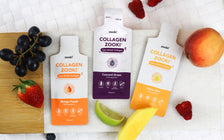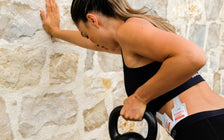Known as the strength protein, collagen has become increasingly popular amongst sports people and athletes, whether professionals or weekend warriors. It forms part of muscles, tendons and ligaments, so as demand for collagen increases as we exercise, a targeted, well absorbed collagen supplement can help support muscle growth and maintenance alongside tendon and ligament strength.
There’s another benefit to taking collagen to athletes which is often missed - and that’s gut health. The gut lining relies on collagen to maintain its integrity. The physical stress that athletes inflict on their bodies through regular or intense exercise can often result in problems with the gut or digestion. Taking collagen can help maintain digestive strength as well as muscular strength.
Collagen for athletes
1. Collagen aids muscle growth & maintenance
One of the key amino acids contained in collagen is called glycine. Once glycine has been absorbed from a collagen-rich food or supplement, it is used to make several key metabolites such as creatine (essential for muscle building); glutathione (master antioxidant) and haem (transports iron around your body) amongst others. Glycine also plays a role in the absorption of fat soluble vitamins and minerals, which are all essential for energy production.
2. Collagen speeds up healing from sports injury
What athletes dread most of course is injury, and it would be rare to find an athlete who hasn’t experienced injury and the inconvenience of rehabilitation at some point in their career. Finding ways to support and even speed up rehabilitation is the focus of significant sports research projects.
We also know that some people are more prone to injuries than others. One of the reasons for this is obviously genetics. We now know that the genes commonly associated with musculoskeletal injuries, particularly in tendons and ligaments, include those responsible for collagen formation.
Type 1 collagen is the primary fibrillar collagen found in most connective tissue throughout your body and a major constituent of bone matrix, tendons, ligaments and cartilage. When your body generates its own collagen, it starts by producing a molecular type 1 pro-collagen. These triple-stranded, rope-like molecules arrange themselves into cross-linked fibrils that form strong type 1 collagen fibres. Some people with variations in their type 1 collagen genes will produce a weaker type 1 collagen and this is associated with cruciate ligament ruptures, shoulder dislocation and ACL ruptures. This is particularly relevant in sports involving sudden deceleration or abrupt changes in direction.
Any healing process is heavily reliant on your body producing enough collagen and protein and the demand for both increases with healing. Supplementing with collagen is an obvious addition to any healing programme, but vitamin C, included in our liquid collagen supplement, is also a very important part of this strategy. Vitamin C allows the enzymes that fold collagen properly to work; which plays a key role in muscle growth and repair.
3. Collagen improves joint and bone health
Collagen is an integral part of the connective tissue in your body and this is what makes up your joints and bones, providing them with flexibility, elasticity and strength.
Connective tissue requires certain amino acids - the ones that make up collagen: glycine and proline - for cell growth. So taking a high-strength marine collagen supplement can have a direct impact on new connective tissue production and in turn, improve joint and bone health.
4. Collagen supports gut health
Another benefit of taking collagen for athletes that's often missed is for gut health, as a very common complaint for athletes is intestinal permeability. The gut lining relies on collagen to maintain its integrity. The physical stress that athletes inflict on their bodies through regular or intense exercise can often result in problems with the gut or digestion.
Gastrointestinal stress affects both performance and endurance and is strongly linked to the immune system. Collagen forms a large part of the underlying tissue in the gut wall called the lamina propria. This layer contains many of the immune cells that travel around destroying pathogens in your food. When you exercise, blood flow is directed away from your gut to your muscles and lungs. This means reduced nutrients and oxygen for your gut, which can result in increased acidity, oxidative stress and inflammation that can disrupt your gut barrier. All leading to an increased risk of intestinal permeability, otherwise known as leaky gut.
Collagen has been shown to reduce the breakdown of the junctions in the gut lining and may also reduce the risk of damage to the mucosal layer covering the gut wall. Taking collagen supplements can help maintain digestive strength as well as muscular strength.
Collagen for ageing athletes
Whilst we may have established that collagen supplements are useful for athletes at any age and stage; they become even more important for the ageing athlete. Your own production of collagen starts to fall from your mid-20s and this decline accelerates rapidly in your 40s and 50s. Ageing is associated with a progressive loss of muscle mass (sarcopenia), which increases the risk of injury and a loss of strength. Men experience a more rapid loss between the ages of 41 and 60, whereas women experience the rapid loss after the age of 60, which is to do with protective hormone levels up until that point. However, older muscle is still able to respond to amino acids. The essential amino acids such as those found in collagen have been shown to actively stimulate muscle protein growth in older people.
Collagen supports both professional, amateur, old and young athletes through its effects on connective tissues, muscle growth and even gut health. Collagen is also important to repair the micro-tears induced during exercise, or more serious injuries when you’ve overtrained.
How can Collagen Zooki help?
Collagen Zooki is a high strength hydrolysed marine collagen supplement that actually tastes good! In 4 delicious flavours (Berry, Citrus Lime, Mango Peach and Concord Grape) and easy to take, on the go sachets, you'll never need to force down a collagen capsule or powder again.
We wrap the collagen in natural lipids to deliver it directly into your system, and we use hydrolysed marine collagen peptides as they're small enough for your body to absorb.
References
2. Nutritional Support for Exercise-Induced Injuries
3. Gastrointestinal Complaints During Exercise: Prevalence, Etiology, and Nutritional Recommendations
4. Exercise regulation of intestinal tight junction proteins
6. Protein Requirements for Master Athletes: Just Older Versions of Their Younger Selves




